There is barely a minute that goes by across Ireland that the fire service are not active. From dealing with fires, road traffic accidents or first-responder incidents to name a few, the service are constantly on high alert.
There is a network of around 220 fire stations across Ireland, the majority of which are made up of mostly retained or part-time firefighters. In all, there are up to 2,000 retained firefighters across the Republic of Ireland.
For farmers close to a fire station, the fire service may offer an attractive off-farm income, as well as a healthy dose of job satisfaction. From speaking with numerous stakeholders with skin in the game, the nature and the manner of the job is certainly something that would suit farmers.
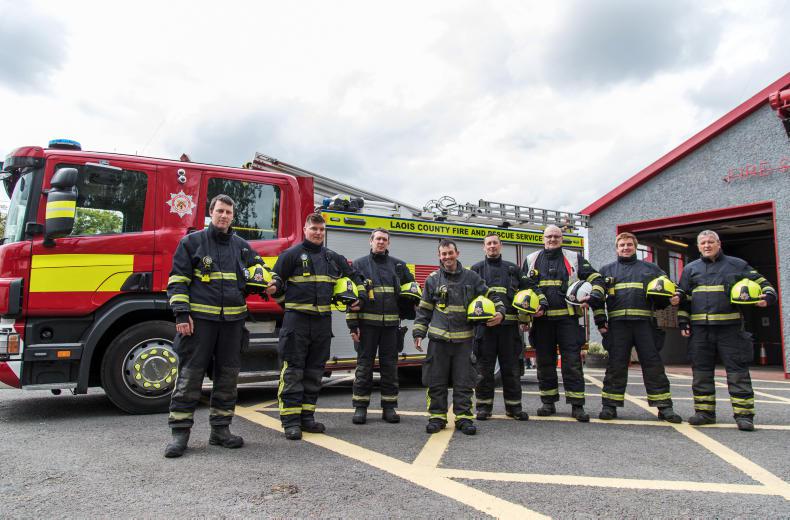
Members of the Durrow fire service at their local fire station. \ Claire Jeanne Nash
Aiden Dempsey is the chief fire officer in Wicklow County Council. He was quick to point out the advantages of getting local farmers into the service.
“We find that farmers bring a great mentality and skillset to the fire service.”
“They have a wide range of practical skills and they are usually community-orientated people. For them, there is the opportunity to contribute to the community and earn a significant amount of money,” Aiden explains.
The income-side of things is certainly attractive for farmers. The annual payment for retained fire fighters for being on-call in the fire service begins at €7,895/year and reaches almost €10,000/year for between five and 10 years in the service. Call out fees and training fees would also be added to this figure ensuring that they can make a pretty penny.
But how does one apply and what is the process of getting into the fire service?
The Application process
The first step in to the process is to establish whether or not you are eligible to apply to the fire service. Staff must be located no more than five minutes away from their station. If they are, the applicant cannot be considered. This is because of the rapid response needed by the emergency service. Aiden noted that the emergency response vehicles aim to be pulling out of the station after a minimum of five minutes and at the latest eight minutes after the alert is raised.
The station officer in the local fire station is generally well known in the locality. They are delighted to meet prospective applicants to discuss all aspects of the service. They will keep your details on record to ensure anyone interested is contacted when recruitment next takes place in the station.
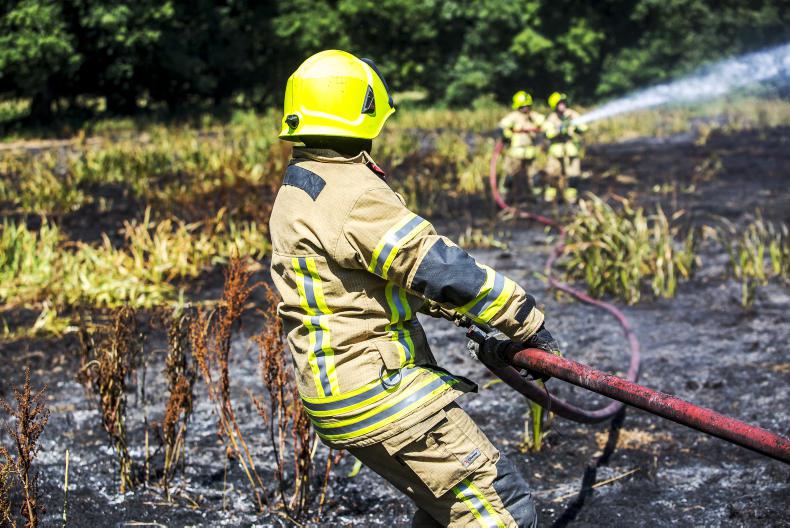
The formal recruitment process begins by submitting an application form to the relevant county council. There are also numerous open nights in stations across the country with the aim to speak with potential recruits.
Individuals are then tested on their suitability for the service with a series of tests in the fire stations, including climbing a 13.5m ladder, undergoing a claustrophobic test, a basic literacy test and a basic physical test (carrying equipment etc).
An interview and medical test makes up the recruitment process.
From there, an extensive training programme is undertaken over subsequent years. The first step is an individual must complete a three-week intensive training course on the basics of firefighting. This is fully compensated by the service, as is food and accommodation with a further €800 paid to the individual per week of training. This qualifies an individual to attend the full range of incidents but in specific limited roles, with a number of other courses provided in the next number of years. Dempsey says it takes between three to five years to become a fully trained firefighter.
What is it like to work for the service?
John Clooney (pictured inset, left) is a beef and tillage farmer from Durrow in Co Laois. John joined the fire service in 2004, having considered the option for a number of years beforehand. Having joined the civil defence the year before, John made the decision to apply for a vacant position which came available.

John Clooney of Durrow fire service. \ Claire Jeanne Nash
“I suppose I had always been interested in joining the fire service. The Durrow station is well-known in the local area and I know the people that work there. A few of them would have recommended me to go for it. I am a hard worker and I was told this job would suit me.”
“It was an extra income. My father also farms with me at home and the farm wouldn’t support the two of us. But you have to have the interest all the same. It is not just about the money.”
After a successful application, John started with the Durrow fire service in 2004 as a rookie, however as Aiden Dempsey noted, the road to becoming a fully qualified firefighter takes time.
“When you begin as a rookie, you are not thrown in the deep end straight away. You are kept back and you do smaller jobs.

“If you come on a crash, you would do traffic duty, or during a fire you would carry equipment. It is a gradual inclusion. People would ask, ‘Are you scared in those early days?’ I never was, I have to say. You are well trained and so is the team, so you trust them,” John said.
“I was placed on a year probation period at the start. The most important thing for the service is that you are available. When your alerter goes off, you are there within five minutes.”
The alerter John mentions is a pager-type device that buzzes once an emergency call is registered at the station. From when it signals, each officer must be at the station within five minutes.
The alerter must be kept with individuals 24 hours a day, seven days a week, each day of the year.
That in itself can be a difficult aspect of the job, John explains.
“If you want to do day-to-day things you have to plan it. If I wanted to go shopping in Portlaoise I would have to let the station know in advance. There can only be two people away from the station at any one time so we all have to plan ahead if we want to do something or take annual leave. That is certainly the hardest part of the job.”
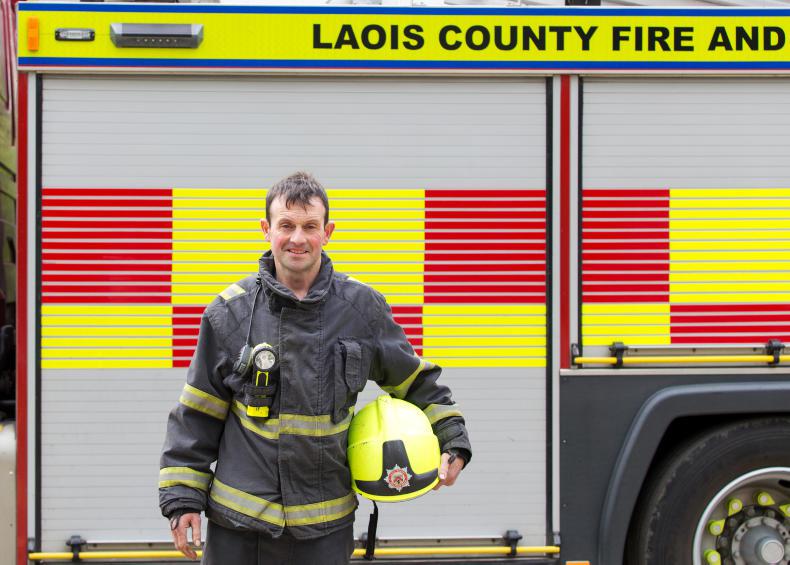
“Even with farm work, if the alerter goes off you have to leave. It doesn’t matter if you are moving cattle, you have to go.
“I am lucky my father helps me out, but you do have to plan for these things. Initially it took some adjusting to but I am used to it by now. The alerter is part of my anatomy at this stage,” he jokes.
On the whole however, the job satisfaction and the financial benefits of a job in the fire service outweighs the negatives. For certain farmers nationwide, the employment option that the service provides may be a perfect fit.
Recruitment
The fire service is constantly recruiting nationwide. If you are interested, contact your local county council.
“The manner of what staff will get called to will vary across the country. For ourselves, around 40% of our calls are minor incidents, 20% would be serious fires and 40% would be road traffic accidents. But again this varies. For example, If a station is located close to a motorway, they may have less road traffic accidents, but those they would be called to would tend to be serious. For those not near a motorway, they may have more road traffic accidents that may not be as serious. It all depends.” – Aiden Dempsey.
Pay scale
Years 0-2: €7,895
Years 2-5: €8,773
Years 5-10: €9,838
There is barely a minute that goes by across Ireland that the fire service are not active. From dealing with fires, road traffic accidents or first-responder incidents to name a few, the service are constantly on high alert.
There is a network of around 220 fire stations across Ireland, the majority of which are made up of mostly retained or part-time firefighters. In all, there are up to 2,000 retained firefighters across the Republic of Ireland.
For farmers close to a fire station, the fire service may offer an attractive off-farm income, as well as a healthy dose of job satisfaction. From speaking with numerous stakeholders with skin in the game, the nature and the manner of the job is certainly something that would suit farmers.

Members of the Durrow fire service at their local fire station. \ Claire Jeanne Nash
Aiden Dempsey is the chief fire officer in Wicklow County Council. He was quick to point out the advantages of getting local farmers into the service.
“We find that farmers bring a great mentality and skillset to the fire service.”
“They have a wide range of practical skills and they are usually community-orientated people. For them, there is the opportunity to contribute to the community and earn a significant amount of money,” Aiden explains.
The income-side of things is certainly attractive for farmers. The annual payment for retained fire fighters for being on-call in the fire service begins at €7,895/year and reaches almost €10,000/year for between five and 10 years in the service. Call out fees and training fees would also be added to this figure ensuring that they can make a pretty penny.
But how does one apply and what is the process of getting into the fire service?
The Application process
The first step in to the process is to establish whether or not you are eligible to apply to the fire service. Staff must be located no more than five minutes away from their station. If they are, the applicant cannot be considered. This is because of the rapid response needed by the emergency service. Aiden noted that the emergency response vehicles aim to be pulling out of the station after a minimum of five minutes and at the latest eight minutes after the alert is raised.
The station officer in the local fire station is generally well known in the locality. They are delighted to meet prospective applicants to discuss all aspects of the service. They will keep your details on record to ensure anyone interested is contacted when recruitment next takes place in the station.

The formal recruitment process begins by submitting an application form to the relevant county council. There are also numerous open nights in stations across the country with the aim to speak with potential recruits.
Individuals are then tested on their suitability for the service with a series of tests in the fire stations, including climbing a 13.5m ladder, undergoing a claustrophobic test, a basic literacy test and a basic physical test (carrying equipment etc).
An interview and medical test makes up the recruitment process.
From there, an extensive training programme is undertaken over subsequent years. The first step is an individual must complete a three-week intensive training course on the basics of firefighting. This is fully compensated by the service, as is food and accommodation with a further €800 paid to the individual per week of training. This qualifies an individual to attend the full range of incidents but in specific limited roles, with a number of other courses provided in the next number of years. Dempsey says it takes between three to five years to become a fully trained firefighter.
What is it like to work for the service?
John Clooney (pictured inset, left) is a beef and tillage farmer from Durrow in Co Laois. John joined the fire service in 2004, having considered the option for a number of years beforehand. Having joined the civil defence the year before, John made the decision to apply for a vacant position which came available.

John Clooney of Durrow fire service. \ Claire Jeanne Nash
“I suppose I had always been interested in joining the fire service. The Durrow station is well-known in the local area and I know the people that work there. A few of them would have recommended me to go for it. I am a hard worker and I was told this job would suit me.”
“It was an extra income. My father also farms with me at home and the farm wouldn’t support the two of us. But you have to have the interest all the same. It is not just about the money.”
After a successful application, John started with the Durrow fire service in 2004 as a rookie, however as Aiden Dempsey noted, the road to becoming a fully qualified firefighter takes time.
“When you begin as a rookie, you are not thrown in the deep end straight away. You are kept back and you do smaller jobs.

“If you come on a crash, you would do traffic duty, or during a fire you would carry equipment. It is a gradual inclusion. People would ask, ‘Are you scared in those early days?’ I never was, I have to say. You are well trained and so is the team, so you trust them,” John said.
“I was placed on a year probation period at the start. The most important thing for the service is that you are available. When your alerter goes off, you are there within five minutes.”
The alerter John mentions is a pager-type device that buzzes once an emergency call is registered at the station. From when it signals, each officer must be at the station within five minutes.
The alerter must be kept with individuals 24 hours a day, seven days a week, each day of the year.
That in itself can be a difficult aspect of the job, John explains.
“If you want to do day-to-day things you have to plan it. If I wanted to go shopping in Portlaoise I would have to let the station know in advance. There can only be two people away from the station at any one time so we all have to plan ahead if we want to do something or take annual leave. That is certainly the hardest part of the job.”

“Even with farm work, if the alerter goes off you have to leave. It doesn’t matter if you are moving cattle, you have to go.
“I am lucky my father helps me out, but you do have to plan for these things. Initially it took some adjusting to but I am used to it by now. The alerter is part of my anatomy at this stage,” he jokes.
On the whole however, the job satisfaction and the financial benefits of a job in the fire service outweighs the negatives. For certain farmers nationwide, the employment option that the service provides may be a perfect fit.
Recruitment
The fire service is constantly recruiting nationwide. If you are interested, contact your local county council.
“The manner of what staff will get called to will vary across the country. For ourselves, around 40% of our calls are minor incidents, 20% would be serious fires and 40% would be road traffic accidents. But again this varies. For example, If a station is located close to a motorway, they may have less road traffic accidents, but those they would be called to would tend to be serious. For those not near a motorway, they may have more road traffic accidents that may not be as serious. It all depends.” – Aiden Dempsey.
Pay scale
Years 0-2: €7,895
Years 2-5: €8,773
Years 5-10: €9,838








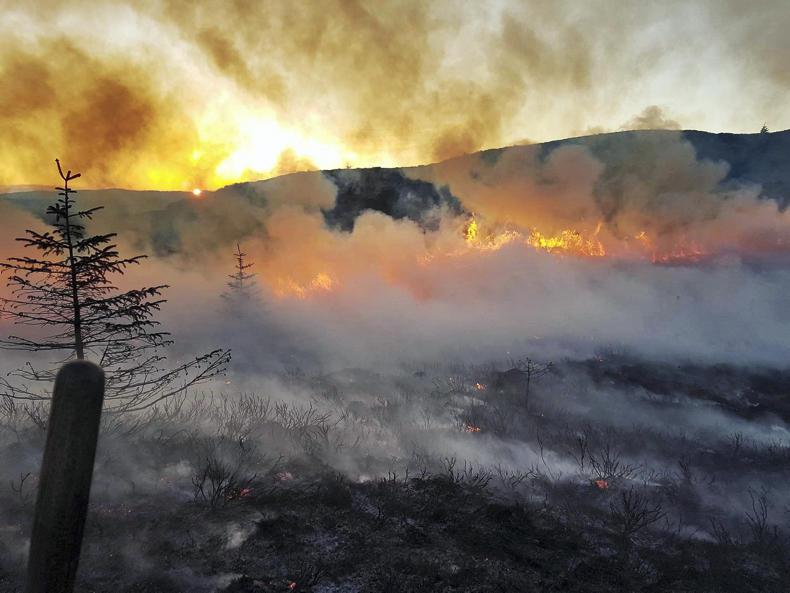



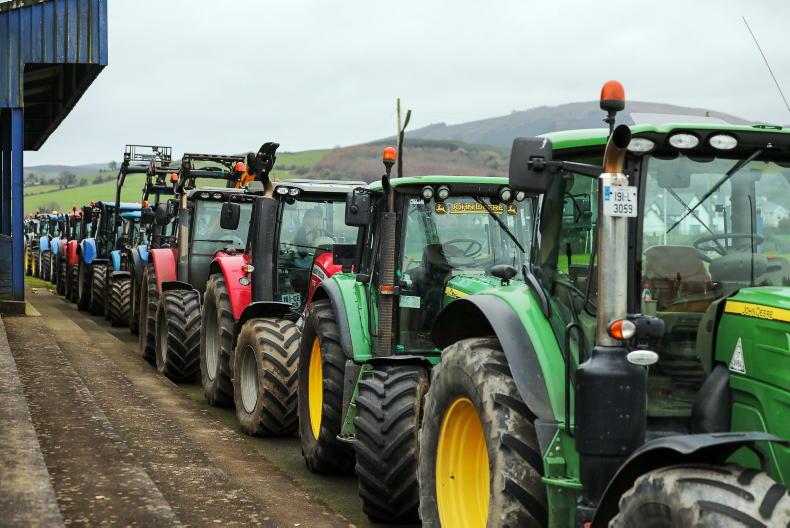

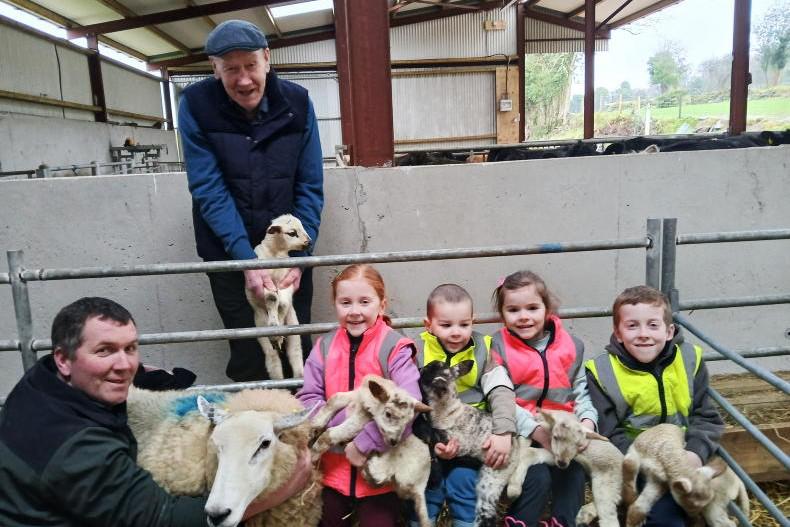
SHARING OPTIONS